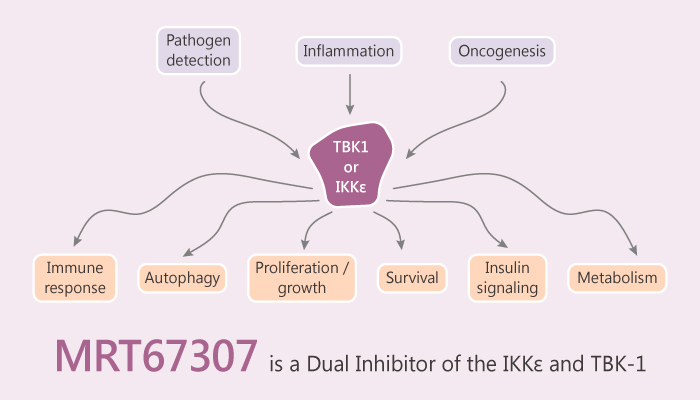IKK {IκB [inhibitor of NF-κB (nuclear factor κB)] kinase} family plays a indispensable role in innate immunity by inducing NF-κB- and IRF [IFN (interferon) regulatory factor]-dependent gene transcription programmes required for the production of pro-inflammatory cytokines and IFNs. A study from Kristopher CLARK discovered and identified MRT67307 as a novel inhibitor of IKKε/TBK1 (TANK {TRAF [TNF (tumour-necrosis-factor)- receptor-associated factor]-associated NF-κB activator}-binding kinase 1). The authors also used it to study the molecular mechanisms that activate these protein kinases and their complement of physiological substrates.

Firstly, in the study, MRT67307 prevented the phosphorylation of IRF3 and the production of IFNβ in macrophages. However, MRT67307 no longer suppressed the activation of JNK or p38 MAPK by poly(I:C) or other agonists.
Additionally, MRT67307 actually enhances phosphorylation in IKKα−/− MEFs, the IL-1-stimulated phosphorylation of p105 at Ser933 and RelA at both Ser468 and Ser536. MRT67307 also enhanced IL-1-stimulated activation of NF-κB-dependent gene transcription in wild-type MEFs.
Furthermore, in another study, MRT67307 (10 μM) was sufficient to reduce phospho-ATG13 to control levels, and in line with the in vitro IC50 values, 10-fold less MRT68921 (1 μM) results in a similar reduction.
Besides, MRT67307 increased IL-10 production and suppressed proinflammatory cytokine production in macrophages. MRT67307 increased CREB-dependent gene transcription by promoting the dephosphorylation of CRTC3. MRT67307 did not inhibit the brain-specific kinases (BRSKs). And it only inhibited the maternal embryonic leucine zipper kinase (MELK) and AMPK itself more weakly.
To sum up, MRT67307 plays a significant role in innate immunology.
Reference:
Clark K, et al. Biochem J. 2011 Feb 15;434(1):93-104.
Petherick KJ, et al. J Biol Chem. 2015 May 1;290(18):11376-83.